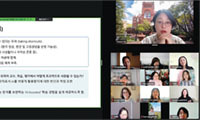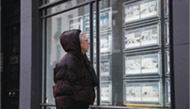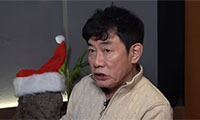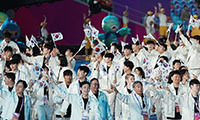Experts Challenge US Claims of North Korean Missile Threat
The claim has been used to support arguments that the United States needs a missile defense system to intercept and destroy missiles fired against it by "rogue states."
David Wright, a weapons expert at the Massachusetts Institute of Technology, said in a telephone interview that a rocket like the one North Korea tested in 1998, "might be capable of reaching Alaska with a very small payload of no more than 100 kilograms (220 pounds)."
He doubted it could reach Hawaii, and added that such a missile would be incapable of reaching either state, let alone the continental United States, with a nuclear warhead weighing between 50 (1,100 pounds) and 1,000 kilos (2,200 pounds).
"All the North Koreans have done is fire a few things into the air," said Zia Mian, of the Center for Energy and Environmental Studies at Princeton University.
"That is a long way from developing an ICBM" or Inter-Continental Ballistic Missile, he said in a telephone interview.
North Korea launched a three-stage Taepo Dong I missile over the Sea of Japan on August 31, 1998, attempting to put a small satellite into orbit.
Mian had been asked to comment on a claim by Jesse Helms, chairman of the U.S. Senate Foreign Relations Committee, that "both North Korea and Iran are within five years of possessing viable ICBMs capable of striking the continental United States."
In a statement in Washington, Helms said "North Korea may already have the capacity to strike Alaska and Hawaii."
The U.S. government acknowledges that deployment of a missile shield which it is currently testing is prohibited by the Anti-Ballistic Missile (ABM) treaty which the United States signed with the Soviet Union in 1972.
President Bill Clinton’s chief adviser on arms control and international security, John Holum, told reporters here on April 25 that the U.S. government hoped Russia would agree to modify the treaty.
Holum said the proposed shield was not designed to make Russia’s nuclear deterrent ineffective, but to protect the United States from attack by rogue states.
"The intelligence analysis is that North Korea is very close to an ICBM capability," Holum said.
Wright told AFP that North Korea was still using "low-level technology" of the kind used in Russian-made SCUD missiles.
It used stable liquid propellants rather than solid fuels or cryogenic substances such as liquid oxygen which give greater thrust, he said, and this too was evidence of its lack of sophistication, he said.
It was difficult to increase the ratio of fuel to body weight necessary to convert a SCUD missile to long-range use, he said.
Wright is a member of the Union of Concerned Scientists, which is opposed to deployment of the U.S. missile shield.
"If a country like North Korea had a nuclear weapon and wanted to use it against the United States, it is unlikely that it would use a missile," he said.
It could not carry out many missile tests without advertising its intentions, he said, and that would mean entrusting a valuable payload to an unreliable rocket.
Such a country would more likely disguise a warhead and deliver it by ship, he said.
Mian asked "how many times do you have to seriously test an ICBM capacity before you would entrust your country’s security with it? At least a dozen successful test would be needed to show you were serious."
Stephen Schwartz, editor of The Bulletin of Atomic Scientists, said North Korea’s launch facilities were primitive.
The Bulletin’s latest issue contains a satellite photo of a missile launch site near the Sea of Japan.
"It’s basically a dirt road," Schwartz said in a telephone interview from Cambridge, Massachusetts.
He added that "people we know who have been to North Korea say their equipment is one-of-a-kind, handmade stuff. That is terrible for quality control. How can you be sure a rocket will work if it is not like the one you have tested?"
스마터리빙
more [ 건강]
[ 건강]이제 혈관 건강도 챙기자!
[현대해운]우리 눈에 보이지 않기 때문에 혈관 건강을 챙기는 것은 결코 쉽지 않은데요. 여러분은 혈관 건강을 유지하기 위해 어떤 노력을 하시나요?
 [ 건강]
[ 건강]내 몸이 건강해지는 과일궁합
 [ 라이프]
[ 라이프]벌레야 물럿거라! 천연 해충제 만들기
 [ 건강]
[ 건강]혈압 낮추는데 좋은 식품
[현대해운]혈관 건강은 주로 노화가 진행되면서 지켜야 할 문제라고 인식되어 왔습니다. 최근 생활 패턴과 식생활의 변화로 혈관의 노화 진행이 빨라지고
사람·사람들
more많이 본 기사
- ‘아픈데 돈도 없다’ 한국 노인 소득빈곤율 OECD 1위
- 박나래, 과거 또 파묘..이번엔 ‘나혼산’ 18L 식용유 장면
- 내란특검, 尹 첫 구형…체포방해 등 … 3
- 중산층이 집을 사지 않는다?… 챗GPT가 내다본 주택시장 미래
- 鄭 “2차 종합특검 새해 첫 법안으로…통일교특검 제3기관 추천”
- 중국 전인대 “美국방수권법, 中핵심이익 훼손…강력 조치 할 것”
- ‘김건희 수사무마 의혹’ 이창수 前지검장, 특검 소환 재차 불응
- “이재명 부친 야반도주” 주장한 전직… 1
- ‘서해피격 은폐 의혹’ 文안보라인 1심 전원 무죄… “증거부족”
- 65세 이경규, 녹화 도중 병원行.. “심장 막혀 스텐트 시술”
- 바야흐로 ‘귀금속 시대’… 금·은·구리까지 사상 최고
- “美 J1비자 ‘현대판 노예’ 사례 속출”…韓대학생 “정화조 청소만”
- 남가주 전역에 ‘물폭탄’… 성탄 연휴 ‘대혼란’
- 원·달러 환율, 당국 개입에 42원 폭락
- 성탄절 캘리포니아 이틀째 악천후…최소 2명 사망
- 푸틴, 우크라 종전안 검토 착수… “거부 가능성 상당하다” 관측
- [2026전망] ‘집권 2년차’ 트럼프발 세계질서 재편 계속된다
- 오헌, 샌디에고 떠나 피츠버그와 입단 합의… 송성문에겐 기회
- 테슬라, “비상사태 시 차문 안 열려… 1
- 북한인, 아마존 위장취업 대거 적발
- 샌프란시스코 정전에 먹통됐던 웨이모, 이번엔 홍수경보에 운행중단
- 한인 박찬영씨 총격살해범은 백인 군인… 1
- [스티브 강 ‘인사이드 미국’] 2026 중간선거: 트럼프 지지율 하락이 말해주는 것
- MC몽, 차가원과 불륜설에 분노 “차 어르신 장난질, 싹 다 고소”
- 최준희, 엄마 故최진실 생일 맞아 추억 “우리 마미 축하”
- 트럼프 얹은 케네디센터 개명 싫어 연… 2
- 한인타운 한복판 주유소서 강도 ‘칼부림’
- 체포 불체자 수만명 물류창고에 수감 추진
- [성탄절 앞둔 우울한 경제상황] ‘내 코가 석자’… 기부 급감
- 잘나가던 백종원, 논란에 흔들.. ‘흑백요리사2’ 복귀로 웃을까?
- [2025년 한 해 ‘진 별’들] 미주 한인사회 원로들 ‘역사의 뒤안길’로
- 여성 살해·자녀 납치 한인 ‘수배’
- 팔레스타인서 구금된 한인 여성 무사 귀환
- [유혜미 칼럼] 치솟는 환율, 경제 지표의 역설
- “대학 학자금 상환 안하면 임금 압류한다”
- ‘라스베가스에서 만난 한인들’
- [윌셔에서] 우리 안의 ‘생각하는 사람’을 깨울 시간
- 중앙정치 실망한 공화 하원의원들 내년 주지사 선거 출마 러시
- 선우용여 “아들, 돈 없어 개밥 먹기도..아파트 마련해줬다”
- [기고] 안정의 기준은 어떻게 제도가 되었나
- [만화경] 해수부 부산시대
- H-1B ‘10만 달러 수수료’ 연방법원, 이의소송 기각
- 한국외대·연세대·한양대 GCEO 연합골프대회 성황
- [왈가 왈부] 내란재판부·정통망법 또 수정… 졸속·땜질 아닌가요
- 트럼프, 성탄절 어린이들과 통화… “나쁜 산타 막을게”
- 쿡, 나이키 주식 매입 2005년부터 사외이사
- “여객기서 빈대 물렸다” 美·유럽 항공사 상대 억대 손배소
- 뚜레쥬르, 뉴욕시 맨해튼 매장 오픈
- 첫 드라이브 스루 매장 BBQ, 뉴저지에 첫 개장
- 2026년, 격동의 스포츠 캘린더…올림픽·월드컵·아시안게임 다 열린다
1/5지식톡

-
 미 육군 사관학교 West Poin…
0
미 육군 사관학교 West Poin…
0https://youtu.be/SxD8cEhNV6Q연락처:wpkapca@gmail.comJohn Choi: 714-716-6414West Point 합격증을 받으셨나요?미 육군사관학교 West Point 학부모 모…
-
 ☝️해외에서도 가능한 한국어 선생님…
0
☝️해외에서도 가능한 한국어 선생님…
0이 영상 하나면 충분합니다!♥️상담신청문의♥️☝️ 문의 폭주로 '선착순 상담'만 진행합니다.☎️ : 02-6213-9094✨카카오톡ID : @GOODEDU77 (@골뱅이 꼭 붙여주셔야합니다…
-
 테슬라 자동차 시트커버 장착
0
테슬라 자동차 시트커버 장착
0테슬라 시트커버, 사놓고 아직 못 씌우셨죠?장착이 생각보다 쉽지 않습니다.20년 경력 전문가에게 맡기세요 — 깔끔하고 딱 맞게 장착해드립니다!장착비용:앞좌석: $40뒷좌석: $60앞·뒷좌석 …
-
 식당용 부탄가스
0
식당용 부탄가스
0식당용 부탄가스 홀세일 합니다 로스앤젤레스 다운타운 픽업 가능 안녕 하세요?강아지 & 고양이 모든 애완동물 / 반려동물 식품 & 모든 애완동물/반려동물 관련 제품들 전문적으로 홀세일/취급하는 회사 입니다 100% …
-
 ACSL 국제 컴퓨터 과학 대회, …
0
ACSL 국제 컴퓨터 과학 대회, …
0웹사이트 : www.eduspot.co.kr 카카오톡 상담하기 : https://pf.kakao.com/_BEQWxb블로그 : https://blog.naver.com/eduspotmain안녕하세요, 에듀스팟입니다…
케이타운 1번가
오피니언
 스티브 강 전 한인민주당협회 회장
스티브 강 전 한인민주당협회 회장 [스티브 강 ‘인사이드 미국’] 2026 중간선거: 트럼프 지지율 하락이 말해주는 것
 김홍일 케이유니콘인베스트먼트 대표
김홍일 케이유니콘인베스트먼트 대표 [기고] 안정의 기준은 어떻게 제도가 되었나
 유혜미 한양대 경제금융대학 교수
유혜미 한양대 경제금융대학 교수 [유혜미 칼럼] 치솟는 환율, 경제 지표의 역설
 성민희 소설·수필가
성민희 소설·수필가 [윌셔에서] 우리 안의 ‘생각하는 사람’을 깨울 시간
 김정곤 / 서울경제 논설위원
김정곤 / 서울경제 논설위원 [만화경] 해수부 부산시대

[왈가 왈부] 내란재판부·정통망법 또 수정… 졸속·땜질 아닌가요
 정숙희 논설위원
정숙희 논설위원온라인쇼핑과 반품, 그리고 그 이후
 파리드 자카리아 / 워싱턴포스트 칼럼니스트 / CNN ‘GPS’ 호스트
파리드 자카리아 / 워싱턴포스트 칼럼니스트 / CNN ‘GPS’ 호스트 트럼프의 새 독트린 “미국을 다시 왜소하게”
 김동찬 시민참여센터 대표
김동찬 시민참여센터 대표 [미국은 지금] MAGA의 분열, 예견된 균열의 시작
1/3지사별 뉴스

“온 세상에 평화를⋯”
숨가쁘게 달려온 2025년을 이제 1주일 남짓 남긴 채 크리스마스 이브를 맞는다. 다사다난했던 한 해를 되돌아보며 마무리하는 연말 시즌과 크리…
H-1B비자 고임금·경력자에 우선권

“한반도 평화정착에 앞장선다”
민주평화통일자문회의 미주지역회의(부의장 이재수)는 22일 기자회견을 통해 내년도 활동 방향과 목표를 밝혔다. 이재수 부의장은 “미주지역회의는…
VA 페어팩스 카운티 실업자 급증

한인들 위한 무료 법률 상담회 개최
샌프란시스코 베이지역 한인회(회장 김한일)는 지난 20일 한인회관에서 북가주 지역 한인들을 위한 무료 법률 상담회를 개최했다. 이날 행사에는 …
여성 살해·자녀 납치 한인 ‘수배’

오늘 하루 이 창 열지 않음 닫기 





















































.png)


댓글 안에 당신의 성숙함도 담아 주세요.
'오늘의 한마디'는 기사에 대하여 자신의 생각을 말하고 남의 생각을 들으며 서로 다양한 의견을 나누는 공간입니다. 그러나 간혹 불건전한 내용을 올리시는 분들이 계셔서 건전한 인터넷문화 정착을 위해 아래와 같은 운영원칙을 적용합니다.
자체 모니터링을 통해 아래에 해당하는 내용이 포함된 댓글이 발견되면 예고없이 삭제 조치를 하겠습니다.
불건전한 댓글을 올리거나, 이름에 비속어 및 상대방의 불쾌감을 주는 단어를 사용, 유명인 또는 특정 일반인을 사칭하는 경우 이용에 대한 차단 제재를 받을 수 있습니다. 차단될 경우, 일주일간 댓글을 달수 없게 됩니다.
명예훼손, 개인정보 유출, 욕설 등 법률에 위반되는 댓글은 관계 법령에 의거 민형사상 처벌을 받을 수 있으니 이용에 주의를 부탁드립니다.
Close
x